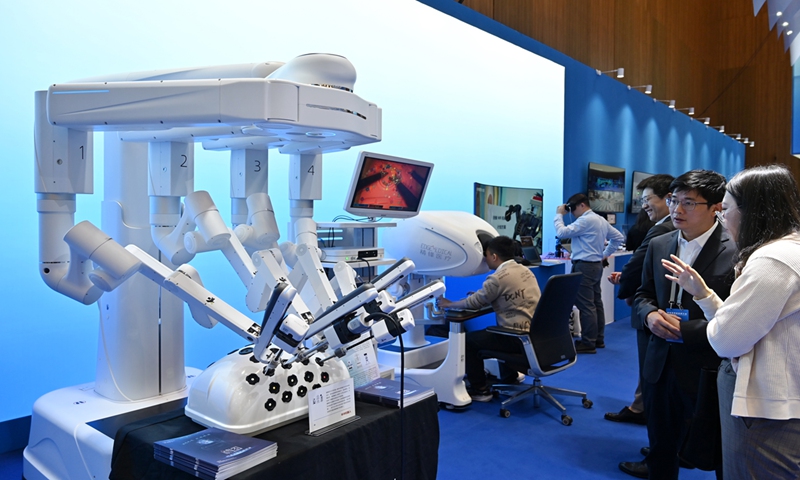
Visitors observe a surgical robot at an exhibition on February 18, 2024 in Shenzhen, South China’s Guangdong Province. The exhibition is being held on the sidelines of the Guangdong Provincial High-Quality Development Conference, which showcases achievements of industrial integration in emerging fields such as medical equipment, artificial intelligence and chips. Photo: VCG
Fostering artificial intelligence (AI) literacy is a long-term endeavor that involves cultivating students’ interest and ability from a young age. A deputy to the National People’s Congress (NPC) suggested on Monday the country integrate AI literacy education into the nine-year compulsory education curriculum, introduce a general AI course, and incorporate relevant content into primary and secondary school activities.
AI stands as a new driver of technological revolution and industrial transformation. Accelerating the development of a new generation of AI is a strategic issue that will determine whether China can seize the opportunities presented by AI innovation, said Lei Jun, CEO of Chinese smartphone maker Xiaomi and a deputy to the NPC.
Looking at the long-term trends, there is a growing demand across industries for talent skilled in basic AI. However, based on the current practical technological level of generative AI in China, there is a clear shortfall of the talent, Lei said.
The shortage of AI talent with a diverse skill set is even more acute. Strengthening talent cultivation in the field of AI will be a key factor in the continued upgrading of China’s industries, he added.
“Therefore, I am for promoting AI literacy education included in the compulsory education system,” he said.
During primary and secondary schooling, students are at a critical period of cognitive development. They are most active and sensitive in their thinking and are most receptive to new things, Lei said.
From fundamental principles to practical applications, it is crucial to comprehensively ignite the interest of primary and secondary school students, cultivate their cognitive and applied abilities in AI, he noted.
It is also recommended to strongly promote the establishment of AI-related majors in Chinese universities, Lei said.
Currently, 498 universities in China offer undergraduate programs in AI, and 209 universities have registered or applied for undergraduate programs in “Intelligent Science and Technology.” However, the numbers represent a relatively low proportion in the backdrop of more than 3,000 universities in China, Lei said.
He also suggested that large technology companies and educational institutions could help cultivate talent specializing in the practical application of AI.
In recent years, many enterprises have emerged as key drivers in the development of AI technology. These companies possess vast data and computing resources, as well as application scenarios. However, there is a severe shortage of high-level AI training capabilities in the talent market.
AI is one of the hot topics discussed by NPC deputies at this year’s two sessions which offers the world a window to observe the country’s development this year.
Lou Qinjian, spokesperson for the second session of the 14th NPC, said at a press conference on Monday that legislation related to technological innovation will be advanced, with a particular emphasis on delving into crucial cutting-edge fields like AI and biotechnology.
China’s AI industry is experiencing rapid growth, with the core industry reaching a scale of 500 billion yuan ($69.46 billion). The number of AI enterprises has exceeded 4,300, and innovative achievements continue to emerge, according to data from the Ministry of Industry and Information Technology.
Global Times

